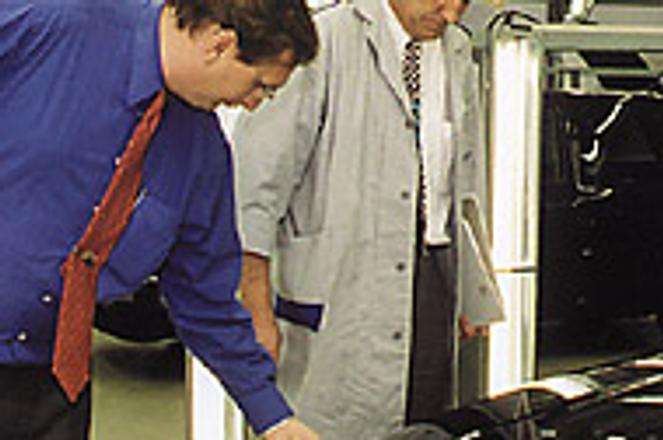German car giant VW will play a huge role in the development of at least one major industrial park.photo: Spectator archives
After a nine-month search for suitable land ended unsuccessfully last summer, American dashboard producer Textron took a two billion crown ($40 million) investment to an industrial park in the Czech town of Hodonín.
Textron's high-profile snub of Slovakia was not the first time an investor had bailed out because of land issues. Belgium firm Bekaert and France's Faurecia also left after initial investment discussions for the same reasons. However, following the February 28 approval of a long-awaited draft law on industrial parks, the situation may not arise again in Slovakia.
The legislation, based on a model approved in the Czech Republic in 1998, will allow municipalities to receive financial help from the government to secure land and prepare infrastructure for foreign investors. In doing so, the government hopes, improved infrastructure would allow an investor to begin construction of a production plant immediately. At present, foreign investors have to purchase land themselves, an often complicated and drawn-out process, as well as foot the bill for creating basic infrastructure for plants.
Approval of the draft was welcomed by foreign direct investment (FDI) experts, who said that industrial parks were a key part in the fight to swing more greenfield investment Slovakia's way ('greenfield' investments involve the construction of new plants, rather than firms buying into existing companies, and tend to create many more new jobs). Slovakia had previously been the only country in the Visegrad Four group (Czech Republic, Hungary, Poland and Slovakia) lacking such legislation.
"The lack of this legislation was a drawback in comparison with these countries. They could attract more foreign investors because they had industrial zones in which they could offer investors land immediately. With this legislation in place, we can expect more foreign investments in Slovakia," said Marek Jakoby, analyst with think tank MESA 10.
Government officials also heralded the new legislation as a boon for potential investment. "After its implementation, this law will contribute to an increase of foreign direct investment," said Vladimír Tvaroška, advisor to Deputy Prime Minister for Economy Ivan Mikloš.
The law, which is expected to come into effect after parliamentary approval some time in the first half of this year, allows municipalities to ask the government to cover up to 70% of costs needed to launch an industrial park. According to the draft, the state would cover costs for building infrastructure such as access roads, water, electricity and gas supplies, and the purchase and renting of land.
Financial support can be provided only if municipalities cover the remaining 30% of total costs, something which analysts say hinges on this year's planned reform of public sector administration (see story, front page). The reforms would allow local authorities to take a larger share of levied taxes in their region than at present, allowing them to cover the costs.
Learning from abroad
Analysts have repeatedly stressed the need for Slovakia to catch up with its regional neighbours in the race for FDI, and have pointed to more advanced legislation, such as that on industrial parks, in those states.
In 1998 the Czech government approved an investment incentives package allowing its government to support construction of industrial parks. "Before 1998 we had several investment failures when many potential investors left for Hungary and Poland because we didn't have industrial zones, and they had them. But after the government approved the package supporting the construction of industrial parks, the situation changed," said Pavlína Bolfová of the Czech investment agency CzechInvest.
In 1998, when the Czech Republic started two pilot project industrial parks, its foreign direct investment stood at $732.5 million for the year. In 2000, it pulled in $1.5 billion of FDI with 34 projects for construction of industrial parks, and a government financial injection of 400 million Czech crowns ($10 million) into the parks
The Slovak government has reserved 500 million Slovak crowns ($10 million) for the support of industrial parks this year. In 2000, the country registered its highest annual total of foreign direct investment - $1.5 billion - matching the combined total between 1993 and 1999.
New hope
American car component producer United Parts Slovakia, based in the western Slovak town of Vráble, has already started to invest in the construction of a local industrial park.
According to Jarmila Župíková, a legal representative at United Parts Slovakia, with the new legislation foreign investors would find it much easier to establish businesses in Slovakia than her firm had. "The law will help others to avoid the kind of problems that our company had to go through when establishing itself in such a park," Župíková said.
Other parks to be launched include an automotive and high-tech park in Lozorno in western Slovakia, an information technology park in the central Slovak town of Lučenec, an industrial zone at Jarovce-Kitsee on the Slovak-Austrian border, and similar zones in western Slovakia's Gabčíkovo and Levice as well as central Slovakia's Námestovo.
But the success of all these projects, Jakoby said, would depend on the co-ordination between municipalities preparing the parks and the government's investment agency, SARIO, in marketing them as investment locations.
"This co-operation is the key to successful implementation of the law, and avoiding the type of investment failures which have occurred in the past," he said.


